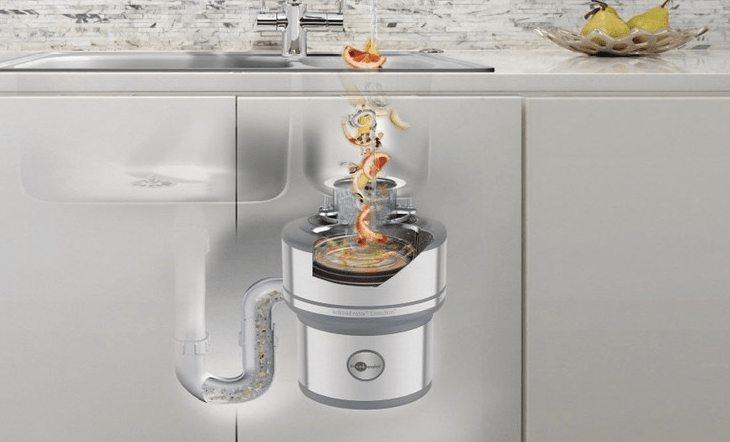The innovative garbage disposal has been a great innovation for renters and homeowners globally. It offers a quick and hygienic way to get rid of food particles, keeping dustbins lighter and free from overflowing.
Due to their simplicity and solid construction, disposals are workhorses, hypothetically crashing frequently.
However, this susceptible piece of innovation can clog on sometimes, mainly due to what is inside it. Therefore, not everything is fit to put in a garbage disposal. So, in this post, we’ll look at ten things that you shouldn’t put in a garbage disposal.
But before that;
What is Garbage Disposal?

Garbage disposal is a device used for getting rid of unwanted food particles. When left uncared for, these food particles lead to the piling of garbage around your home, and may also result in unpleasant odor or even illnesses caused by a foul smell.
Therefore, garbage disposal assists in ensuring that the area within the kitchen is free of food particles.
There are two types of Garbage Disposal; The Batch Feed Garbage Disposal and the Continuous Feed Garbage Disposal.
These two garbage disposal types serve the same purpose but different features.
10 Things You Should Not Put In A Garbage Disposal
Well, below are ten things that you shouldn’t put in a garbage disposal;
- Grease and Oil
- Rice and Pasta
- Eggs shells
- Animal Bones
- Fibrous Vegetable
- Harsh Chemicals
- Coffee Grounds
- Spoons and Utensils
- Pumpkins
- Non-food materials
Grease and Oil
Grease and oil are not friendly to garbage disposals. You may wonder why they can’t be flushed-down the disposals, yet they don’t need any grinding, and it may work in a short time. However, the oil and grease may reduce the grinding effectiveness by filling the grinding ring’s gaps.
Grease and oil also thicken in the drain causing clogs and may also result in the decaying odor.
Rice and Pasta
Rice and pasta usually swell when in contact with water, and they also form a sticky-slim thing. This thing can stick to the grinding chamber walls or the drain pipes, which may cause congestions or other damages, just like grease and pasta. It may get nasty trying to remove them from the disposal.
Egg Shells
The tiny teeny egg membrane can cause problems in the disposal. It can stick to the grinding components and result in glitches. Hence the disposal can handle these membranes and pose no threat—however, the number of eggshells you put here matters. Grinding 2-3 shells at a time is okay, but not 60.
Animal Bones
Bones are, no doubt, hard to grind. Some people grind small fish and chicken bones and never cause them any problems. However, it is generally not a good idea. The disposals are high-powered, about ¾ or 1 HP, and the bones added in a small bunch. Therefore, please do not add them in bulk.
Fibrous Vegetable
There are some vegetables which shouldn’t add in a Disposal unit. Vegetables like asparagus and Celery are very fibrous, and that makes them hard to buy the machine. Therefore, these stringy food items may cause more damages and clogs to the garbage disposal.
Harsh Chemicals
Your kitchen sink is not a chemistry laboratory. Therefore, some chemicals may mess up your garbage disposal. These harsh chemicals, such as bleaching powder when contacted with the grinding components of the garbage disposal, can lead to corrosion because of the abrasive elements of galvanized steel. Therefore, keep these chemicals away from your garbage disposal.
Coffee Grounds
Coffee grounds appear harmless and easy to grind. Moreover, they are minced to make coffee. A 1HP disposer can do the same thing, right? Coffee ground is an excellent material to scrape, clean, and sharpen the grinding gears. Hence they do not cause any harm to the disposal. However, coffee grounds can cause bad clogs in the pipeline, and this is why coffee grounds shouldn’t be put in a garbage disposal.
Spoons and Utensils
It is evident that spoons and utensils are not food particles, and no one has ever ground them in the disposals as food particles. However, you should always keep these items from your sink as far as possible when operating garbage disposal. A steel knife may accidentally fall into the destruction and cause a lot of harm to the machine.
Repairing the garbage disposal may be costly. Therefore, the best thing to do to prevent this from happening is keeping spoons and utensils far away from the garbage disposal.
Pumpkins
You know how pumpkins are sticky. Even though they are juicy and slim, pumpkins may stick on to the grinding blades and form a clog when thrown down a garbage disposal. Dismantling and cleaning the pipes is the only way of getting rid of a pumpkin clog. Therefore, to avoid all these, keep pumpkins away from your garbage disposal.
Non-Food Materials
The name garbage disposal can be misleading sometimes however it doesn’t imply that you should now treat your disposal like garbage. Non- food materials like towels, tissue papers, and plastic wrappers can be problematic to your drainage system.
These non-food items can also spread through your drainage system into the water supply. This can lead to massive water pollution, and therefore, you should keep non-food materials away from your disposal.
Conclusion
The garbage disposal is an excellent and convenient device for keeping food wastes away from your kitchen. It helps to make the kitchen clean and with enough space to conduct your kitchen business. However, when you decide to put everything you come across in a garbage disposal, then there might be a big problem as the disposal may spoil.
Therefore, the above mentioned are the ten things that you shouldn’t put in a garbage disposal. Thus ensuring the device lasts longer and serves it’s intended purpose.
